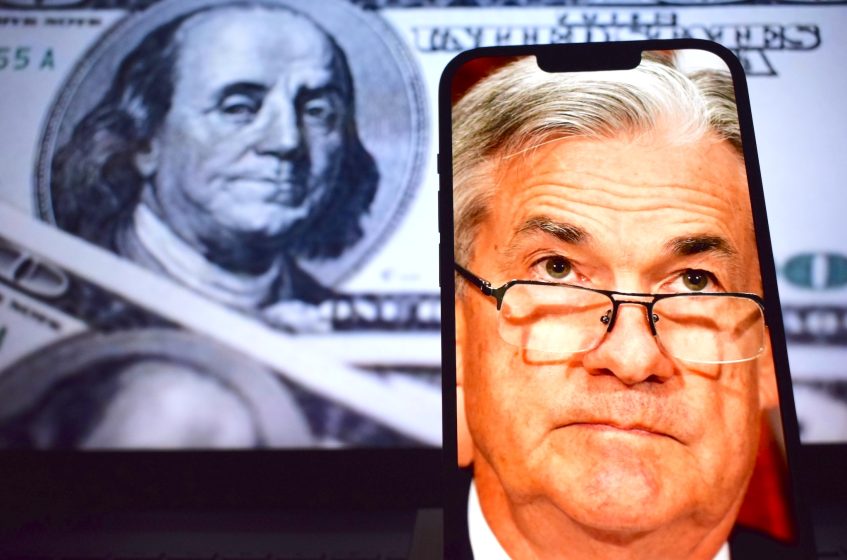
U.S. monetary policy: 2025 Q2 review and outlook
Dr. Chi Pui Ho and Dr. Xiyue Cao
16 July 2025
High inflation emerged as a top concern for the U.S. economy in early 2022. While the inflation has come down a great deal, as of 2025 Q2, it remains somewhat above the Federal Reserve’s (the Fed) 2 percent longer-run objective. While the FOMC has been carrying out policies aiming at bringing inflation back down to its 2% target over the long run, headwinds caused by the new administrative change and global events (e.g., Israel Iran Conflict) have introduced new uncertainties into economic outlooks and policy calibration. This article is to give a brief summary of the 2025 Q2 U.S. economic aspects and monetary policy dynamics.
While inflation has moderated substantially since its mid-2022 peak, it continues to persist above the 2 percent longer-run target. According to the Fed, “Estimates based on the Consumer Price Index and other data indicate that total PCE prices rose 2.3 percent over the 12 months ending in May and that, excluding the volatile food and energy categories, core PCE prices rose 2.6 percent.”
As for the labor market, supply and demand conditions have come into better balance. “The unemployment rate, at 4.2 percent, remains low and has stayed in a narrow range for the past year”. If labor demand continues to substantially exceed the supply, this would continue to exert upward pressure on wages and prices. That’s especially true for the labor-intensive sectors such as the service sector. As the labor market conditions have continued to cool, it has been well accepted since the late of last year that the labor market is no longer a source of elevated inflationary pressures. “A wide set of indicators suggests that conditions in the labor market are …. consistent with maximum employment”.
First-quarter GDP showed a modest decline, while Private Domestic Final Purchases (PDFP) – excluding net exports, inventories, and government expenditures – expanded at a healthy 2.5% annualized pace. “Within PDFP, growth of consumer spending moderated while investment in equipment and intangibles rebounded from weakness in the fourth quarter.”
A number of administrative changes and policy uncertainties have weighed on the U.S. economy in 2025, particularly in the realm of international trade. During Donald Trump’s second presidency, he enacted a series of protective tariffs affecting nearly all goods imported into the United States. From January to April 2025, the average effective US tariff rate rose from 2.5% to an estimated 27%, the highest level in over a century. 1 Following policy rollbacks prompted by economic turmoil, the average effective tariff rate stood at 15.6% as of June 2025. 2 3
The U.S. economy has long relied on importing goods from countries with lower production costs, enabling American consumers to purchase products at reduced prices. Higher tariffs have undoubtedly exerted upward pressure on prices in the short term, as access to affordable imports has diminished. Additionally, tariffs on critical inputs like steel and aluminium have burdened supply sectors, further intensifying cost pressures in the short run. Beyond tariffs, administrative policy uncertainty has significantly undermined confidence—both domestically and internationally—in the U.S. economy. According to the Fed, “Near-term measures of inflation expectations have moved up over recent months, as reflected in both market- and survey-based measures. Respondents to surveys of consumers, businesses, and professional forecasters point to tariffs as the driving factor.”” Surveys of households and businesses, however, report a decline in sentiment over recent months and elevated uncertainty about the economic outlook, largely reflecting trade policy concerns”.
In addition to domestic policy impacts, several major global events have also introduced challenges and uncertainties for U.S. prices and economic conditions. On June 13, 2025, Israel launched strikes on Iran, prompting a severe retaliation. We extend our sincere sympathy to all civilians affected. We would like to emphasize that we do not intend to discuss the political or religious dimensions of this conflict but solely focus on analyzing its potential impact on the U.S. economy and monetary policy adjustments.
To address the inflation surge and bring inflation down to 2 percent over the longer run, the FOMC has voted to incrementally raise the target range of the federal funds rate (FFR), meeting by meeting, to its peak in 2023 of 5-1/4 to 5-1/2 percent. As labor market tightness eased and supply came into better alignment with demand, inflationary pressures subsided. Consequently, beginning in September 2024 and continuing through the remainder of the year, the Fed lowered the target range for the policy rate to 4¼ to 4½ percent – a full percentage point reduction from its peak – while simultaneously continuing to significantly reduce its securities holdings.
By June 2025, the Committee has maintained this same target range of 4¼ to 4½ percent for the federal funds rate. Notably, by June 2025, the FOMC did not signal any additional reductions to the federal funds rate target range. For nonconventional monetary policy in 2025, the Fed has been proceeding with balance sheet reduction. The sole adjustment to the pace of this reduction occurred in April, when the Fed slowed the pace of runoff. After seeing indications of tighter money market conditions (despite overall reserves remaining abundant), the Fed aimed to achieve its long-term balance sheet target more gradually. Specifically, they “Beginning in April, the monthly cap on Treasury redemptions will be lowered from $25 billion to $5 billion. Consistent with the Committee’s intention to hold primarily Treasury securities in the longer run, we are leaving the cap on agency securities unchanged.” This adjustment extends only the timeline—not the ultimate size—of the balance sheet reduction.”
The Fed has explicitly expressed concerns about uncertainties arising from administrative changes to trade, immigration, fiscal, and regulatory policies. Given that their economic impacts remain unclear, the Fed has refrained from making any impulsive policy moves, opting instead to wait for greater clarity as events unfold more.
As mentioned, the U.S. economy is currently solid: the labor market is consistent with maximum employment; supply sectors have been improving and better aligned with demand; and PDFP grows at a solid rate. The current policy stance is substantially less restrictive, and we are now in the process of gradually transitioning to an even less restrictive or more neutral policy setting. Conditions may warrant beginning to consider a gradual reduction in policy rates, however, new administrative policy changes and global events – particularly the Israel-Iran conflict – have introduced fresh uncertainties into both economic projections and policy calibration.
Based on the economic data and information available in June, we agree with the FOMC’s decision to temporarily pause further policy rate reductions while monitoring how these events unfold and assessing the economy’s adaptive response. The FOMC is dedicated to achieving a balance possible between the necessity to alleviate inflationary pressure and the risk of sluggish labor market and low economic growth. With inflation having moderated and labor market conditions easing in 2025, upside risks to inflation have receded while downside risks to employment have grown.
As previously discussed, these administrative changes—particularly tariffs—would exert upward pressure on prices. Additionally, tighter immigration controls may lead to short-term labor market tightening, which could subsequently strain supply chains and feed into inflationary pressures. While the Fed has not explicitly mentioned it, they would have considered the economic impact of the Israel-Iran conflict. At the time of writing, the evolution of this event remains highly uncertain, and the possibility of direct U.S. involvement—or even a broader global conflict—cannot be dismissed. What is certain is that such an event would trigger a surge in oil prices, disrupt supply chains, and exert upward pressure on U.S. inflation.
That all being said, despite heightened uncertainties, we can confidently assert that none of these occurrences would alleviate inflationary pressures or improve (non-defense civilian) labor market conditions in the short run. Given these considerations, we believe that adopting an even less restrictive policy stance by lowering rates too soon could risk exacerbating inflationary pressures; even though the price effects of tariffs are generally considered short-term, it is critical to prevent this temporary surge from becoming persistent. This is particularly true given the economy’s current strength, which eliminates any pressing need for immediate rate cuts to stimulate consumption and investment.
Remark 1:Reddy, Sudeep (April 10, 2025). “Reality Check: What Trump’s Supposed Retreat Really Means in a Historic Trade War“. Politico.
Remark 2:“State of U.S. Tariffs”. The Budget Lab at Yale. June 1, 2025.
Remark 3:Irwin, Neil (June 5, 2025). “Trump’s incredibly volatile tariff landscape, in one chart”. Axios. Retrieved June 16, 2025.
Remark 4﹕Neil Crosby (Jul 09, 2025), “Oil Markets Are Tighter Than They Look”.







